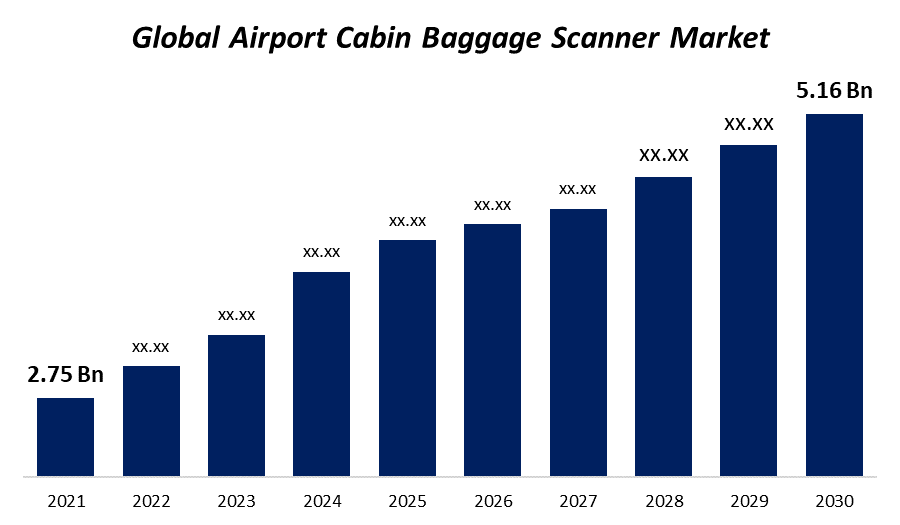Global Airport Cabin Baggage Scanner Market Size To Hit USD 5.16 Billion By 2030 | CAGR 10%
Category: Electronics, ICT & MediaGlobal Airport Cabin Baggage Scanner Market Worth USD 5.16 Billion By 2030: Statistics & Facts
According to a research report published by Spherical Insights & Consulting, the Global Airport Cabin Baggage Scanner Market Size to grow from USD 2.75 billion in 2021 to USD 5.16 billion by 2030, at a Compound Annual Growth Rate (CAGR) of 10% during the forecast period. The main reason behind the growth of the industry is the increasing adoption of technologies like Artificial Intelligence (AI) and Machine Learning (ML) which help in detecting threats.

Get more details on this report -
Browse 57 market data Tables and 65 Figures spread through 215 Pages and in-depth TOC on "Global Airport Cabin Baggage Scanner Market Size, Share, and COVID-19 Impact Analysis, By Component (Consulting, Installation & Maintenance), By Scanner Type (2D {X-Ray, 3D {Computed Tomography}), By Airport Type (Commercial Service Airports, Cargo Service Airports, General Aviation Airports), by Region (North America, Europe, Asia-Pacific, Latin America, Middle East, and Africa), Analysis and Forecast 2021 – 2030” in detail along with the table of contents. https://www.sphericalinsights.com/reports/airport-cabin-baggage-scanner
A screening system known as an airport cabin baggage scanner is frequently used to carry out specific operations, such as examining the bags and monitoring through electronic devices. In airports, the luggage is scanned using these technologies before it is transferred to the aeroplane. Due to the security concerns in the densely packed airports, scanner systems have gained a lot of awareness throughout the world. In reality, airport cabin baggage scanner manufacturers place a high priority on technology breakthroughs and improvements in baggage screening systems. The global airport cabin baggage scanner market is expected to increase as a result of rising air traffic and rising demand for air travel. The development and implementation of effective baggage scanners is receiving significant attention from manufacturers of airport cabin baggage scanners. Additionally, the current baggage screening procedures have seen a significant upgrade that might enhance an airport's effectiveness and performance. The exorbitant expenses associated with scanner systems are going to seriously jeopardise market expansion. In addition, hefty installation costs, followed by regulated maintenance requirements and improved platforms, limit market expansion during the anticipated time period. Additionally, there are other rivals on the market who compete on a variety of fronts, including product, price, quality, dependability, and aftermarket services. These factors present clear obstacles for new competitors that may slow the market's expansion.
Hardware segment registers highest growth rate of 5%.
On the basis of component, the global airport cabin baggage scanner market is segmented into hardware, software, services. The consultation, installation, and maintenance subsegments of the services segment are further subdivided. With a 5% growth rate, hardware is leading the market among these. The primary factor driving the market's expansion is the growing significance of speeding up entry and departure processing times at airport security checkpoints. The gadget aids in meeting security requirements, which has significant operational advantages such as the abolition of arbitrary trace detector searches, increased security, increased staff productivity, and improved passenger experience. In order to improve services for airline customers and prevent long passenger lines at airports, the federal government is now working on significant initiatives to enhance the hardware and infrastructure of existing airports.
3D (Computed Tomography) segment will grow at a CAGR of 7%.
Based on scanner type, the global airport cabin baggage scanner market is segmented into 2D (X-Ray), 3D (Computed Tomography). Due to its increased operational effectiveness and security management, the 3D (Computed Tomography) segment is expected to rise at a CAGR of 7% over the anticipated timeframe. The aviation segment is implementing cutting-edge scanning technologies that adhere to the directives of the European Civil Aviation Conference in order to effectively detect illegal goods.
Commercial Airport Services is dominating the market.
On the basis of airport type, the global airport cabin baggage scanner market is segmented into commercial service airports, cargo service airports, general aviation airports. Due to the rise in travel and passenger traffic, the commercial service airports segment is leading the industry with the biggest market share. Due to these factors, the aviation sector has been forced to implement sophisticated airport cabin baggage scanners that provide real-time and advanced analysis of dangerous materials and suspicious luggage.
Asia Pacific to register the largest market growth over the forecast period.
The Global Airport Cabin Baggage Scanner Market has been segmented into five major regions: North America, Europe, Asia-Pacific, South America, The Middle East and Africa. Due to increased expenditures in infrastructure improvements, the Asia Pacific market now accounts for 20% of the global revenue, which is the greatest market share. In addition, by integrating cutting edge technologies like biometrics and automated lanes, airport officials are placing a focus on enhancing security standards and facility efficiency.

Get more details on this report -
Key Vendors Airport Cabin Baggage Scanner : Analogic Corporation, Giladoni Spa, Autoclear, Astrophysics Inc., Rapiscan Systems, Nutech Company, Leidos, Smiths Group PLC, Totalpost Mailing Ltd., Vehant Technologies, Westminster Group PLC
Contact Us: https://www.sphericalinsights.com/contact-us
Need help to buy this report?